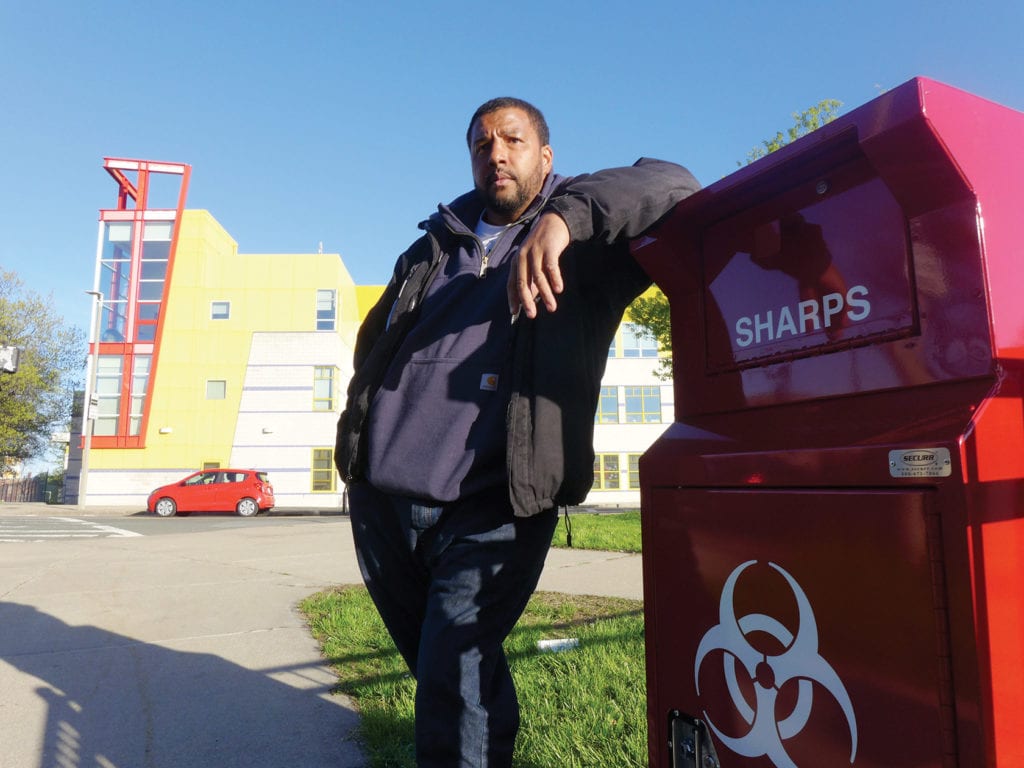
The city’s decision to install kiosks to accept discarded hypodermic needles in front of and behind the Orchard Garden’s K-8 School has sparked controversy, with critics complaining the measure will do little to keep drug users away from children who attend the school.
“It’s basically giving the green light for people to use the school grounds as an injection site,” said community activist Domingos DaRosa, who regularly clears discarded needles from the Orchard Gardens school grounds.
During the first week the kiosks were installed, DaRosa said, there’s little evidence they have made a positive difference. On Monday of last week, students arriving at the school found a man sleeping under a play structure in the school yard.
DaRosa said that after injecting heroin, many users are unwilling or unable to dispose of their needles safely.
“There’s needles across the street from the box every day,” he said.
A temporary 6-foot-high fence in front of the school does little to keep users out of the un-fenced school yard in the rear of the building, where DaRosa says he and school staff often find discarded needles and the occasional sleeping user. Last year, Orchard Gardens students were stuck with needles on two occasions while playing in the school yard.
DaRosa says that rather than placing a kiosk in the park behind the school, the city should install fencing behind the building to secure the playground with a crash bar gate to allow emergency egress from the school.
“They need a locking fence,” he said. “All entry points to the school should be locked.”
DaRosa, who runs a landscaping company, said the cost of installing fencing around the school would be less than the cost of the two $5,000 needle kiosks.
In a statement sent to the Banner, a Boston Public Schools spokesman said the department will erect a permanent, decorative fence at the front of the school, tall enough to prevent trespassing. The rear of the school, however, will remain un-fenced.
The BPS statement said custodial staff members have been trained on sharps safety by the Mayor’s Office of Recovery Services and conduct sweeps of the school grounds three times a day: before school, before recess, and before dismissal.
“The problem of discarded needles being discovered in public areas within the city, particularly in the area surrounding Orchard Gardens K-8 School in Roxbury, is one that the Boston Public Schools takes very seriously,” the BPS statement reads. “The growing scope of this safety concern has required additional steps be taken to protect the Orchard Gardens K-8 School community.”
Additionally, the BPS Facilities Department conducts weekly checks of the grounds for debris, and will begin power-washing the playground equipment, cleaning the grounds and spreading new mulch. DaRosa said users have defecated in the existing mulch in the plantings around the building in recent months.
Even with the enhanced cleaning schedule, DaRosa says, keeping children safe will remain a challenge.
On a recent walk-through, the front of the building, secured by the temporary fence, was clear of needles. But on the grassy margins of Melnea Cass Boulevard, users were seen Monday afternoon cooking and injecting heroin within sight of the front of the Orchard Gardens school building. In the grassy area that DaRosa says some Orchard Gardens students walk by on their way to school, the ground was littered with needles, discarded saline solution bottles used for cleaning needles, and orange needle caps. Users, many of whom receive 10-packs of needles from the Access, Harm Reduction, Overdose Prevention and Education Program nearby on Albany Street, discard the empty plastic needle bags on the grass.
With free needles and the needle disposal kiosks, DaRosa said city officials may be sending the wrong message.
“They’re turning the whole city into a safe injection site,” he said. “But the children here aren’t safe.”







